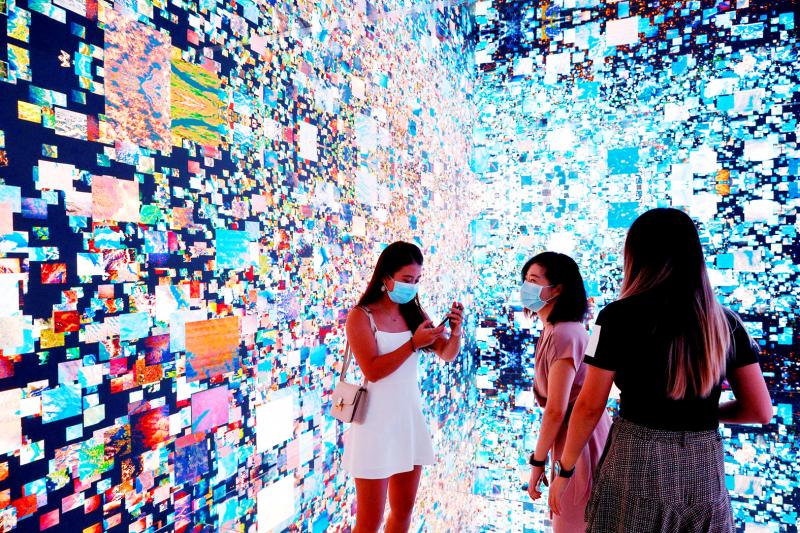The metaverse is a virtual universe that blends aspects of digital technologies including video-conferencing, games like Minecraft or Roblox, cryptocurrencies, email, virtual reality, social media and live-streaming. Quite how these pieces will fit together is a work in progress, but some tech giants already see it as the future of human communication and interaction. It’s “the next frontier,” Mark Zuckerberg said when he changed his company’s name from Facebook Inc. to Meta Platforms Inc.
What will it look like? It may be easier to grasp the concept by first saying what it isn’t: It’s not a single product, it’s not a game, and it’s not being created by one company. Rather, it’s akin to a 3D World Wide Web, where businesses, information and communication tools are immersive and interoperable.
In a way it’s a digital facsimile of how we live in the physical world. Just as you might create a document in Microsoft Word and send it via Gmail to a colleague to read on an iPad, items in the metaverse should be able to move across an ecosystem of competing products, holding their value and function. An original piece of digital art bought as a non-fungible token, or NFT, from Company A, say, should be displayable on the virtual wall of a house in a game made by Company B.

Photo: Reuters 照片:路透
The metaverse won’t reach its full potential — millions of people accessing and living in the virtual world anywhere, at any time — without ultrafast Internet. That’s why mobile carriers around the world are spending billions of dollars to build 5G networks.
The rise of the metaverse also presents a tangle of legal and regulatory issues to be resolved. Some of the thorniest issues around the metaverse revolve around users’ personal data and privacy rights.
(Bloomberg and Reuters)
「元宇宙」是虛擬的世界,融合了數位技術諸方面,包括視訊會議、Minecraft或Roblox等遊戲、加密貨幣、電子郵件、虛擬實境、社群媒體與網路直播。要如何把這些東西組合起來,各方仍在努力,但一些科技巨頭已將元宇宙視為人類溝通與互動的未來。這是「下一個新領域」,馬克‧祖克柏在將其公司名稱由「臉書」更改為「元平台」時說道。
元宇宙會是什麼樣子?要理解這個概念,或許先說明它不是什麼比較容易:它不是單一產品,不是一種遊戲,也不是由一家公司所創建的。相反地,它像是三度空間的全球資訊網,其中的商家、訊息與通訊工具,是沉浸式、可互操作的。
它有點像是我們現實世界生活方式的數位複製品。正如您可以在Microsoft Word中建立文件,並透過Gmail發送出去,讓同事可以在iPad上閱讀一樣,元宇宙中的物件應能夠在競爭對手產品的生態系統中移動,而保留其價值與功能。例如,從A公司購買的作為非同質化代幣(或稱NFT)的原創數位藝術作品,應該可以在B公司製作的遊戲中顯示在虛擬屋牆上。
若沒有超高速網路,元宇宙將無法發揮其全部潛力,讓數百萬人隨時隨地存取及生活在虛擬世界中。這就是為什麼世界各地的電信業者要花費數十億美元來建設5G網路。
元宇宙的興起也帶來一連串法律與監管問題,有待解決。與元宇宙相關的一些最棘手問題,主要是跟用戶個資與隱私權有關。
(台北時報林俐凱編譯)

For many people in Taiwan, childhood memories of rural life include pig pens standing beside family homes. Leftover rice, vegetable scraps and soup from daily meals were poured into buckets and fed to pigs. This practice of feeding pigs with household food waste was once a common way of life, both an economic choice and an expression of agricultural society’s deep respect for conserving resources. From a practical standpoint, pigs are omnivorous animals capable of efficiently digesting food scraps that humans can no longer eat. For rural households, food waste cost almost nothing, yet it could be converted into pork, a

Tango unfolds in a dimly lit room, where a haunting melody ushers two dancers into a close embrace. Here, music and movement merge into a silent yet passionate conversation, expressing longing, memory and shared purpose. What makes tango truly magical is the deep interaction and spontaneous improvisation between partners. Tango began in the late 19th century in Buenos Aires, Argentina’s bustling capital. Born in the poor working-class neighborhoods and busy port areas, this dance emerged from a melting pot of cultures. European immigrants, African slaves and local residents all contributed to its unique character. From these rich influences, tango

A: What show are you watching online? B: I’m watching “Fly Me to the Moon & Back” – an exhibition launched by the Taipei Music Center (TMC) to commemorate the late singer Tom Chang. A: Known for his sky-high notes, Chang is praised as one of the best singers in the 1990s. His death at the age of 31 was a major loss indeed. B: And I’m so glad that we went to the TMC’s 90s-themed concert last Friday. I finally saw the iconic “Godmother of Rock” WaWa perform live. A: This year-end show also featured singers Princess Ai, Bii, Wayne Huang, PoLin and

A: Apart from the Taipei Music Center’s exhibit and concert, US pop rock band OneRepublic and rapper Doja Cat are touring Kaohsiung this weekend. B: OneRepublic is so popular that after tonight’s show at the K-Arena, they are set to return to Taiwan again in March next year. A: And Doja will also perform at the same venue on Sunday, right? B: Yup. Her collab with Blackpink’s Lisa and singer Raye for the song “Born Again” has been a huge worldwide success. A: Doja even made it on Time magazine’s “100 Most Influential People” list in 2023. She’s so cool. A: 本週末除了北流的特展和演唱會外,美國男團共和世代和饒舌歌手蜜桃貓朵佳也將來台開唱。 B: 共和世代因太受歡迎,繼今晚高雄巨蛋的演唱會後,預計明年3月即將再度來台巡演唷。 A: 朵佳本週日將在同場地開唱,對不對?